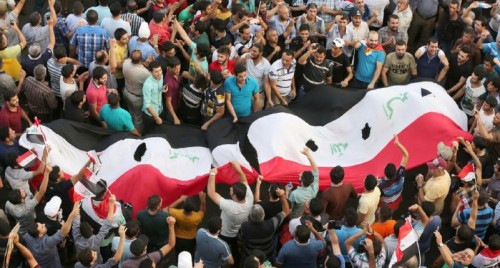PHOTO: Protest in Baghdad, August 7, 2015
Balsam Mustafa writes for EA:
On Sunday, Iraq’s Prime Minister Haider al-Abadi announced on State TV a series of reforms to be approved by the Cabinet and the Parliament.
The measures:
*Abolish the positions of the three Vice Presidents and the three Deputy Prime Ministers;
*Reduce ministries and institutions;
*End the “exceptional provisions” for both retired and current senior officials in all State institutions;
*Implement an “immediate and comprehensive reduction” in personal guards for officials;
*Form a higher committee to open past and present files on corruption;
*Abolish the “party and sectarian quotas” for all senior positions in State institutions, with qualified candidates to be chosen by a “professional” committee appointed by the Prime Minister.
The measures follow summer protests that erupted in ten Iraqi cities, including Baghdad, against administrative and financial corruption of politicians and political parties. Last Friday, the leading Shia cleric in Iraq, Grand Ayatollah Ali al-Sistani issued a statement calling on al-Abadi to issue “braver resolutions” and take “substantial measures” against mismanagement and corruption.
The Protests
For more than a decade, Iraqi people have suffered a bitter reality of daily car bombs, lost security, and bad services. This was aggravated last year when the Islamic State (Da’esh) captured different cities, displacing, enslaving and killing thousands of Iraqis, with ongoing battles to take over the occupied cities.
This suffering reached its climax with the heat wave exceeding 50 degree Celsius (122 Fahrenheit) combined with the persistent power cuts since mid-July. Hundreds of people in cities in southern Iraq took to the streets in protests. In one demonstration in the city of Basra, a young protestor named Murtada was shot dead by security forces using live ammunition.
These protests and the death of Murtada were the spark for a group of intellectuals in Baghdad to call for more demonstrations in the capital and Iraqi cities. Writers, journalists, artists, academics, and activists spent days and nights mobilizing people to stand up for their rights. This was a last chance for Iraq to redraw the image of its recent history.
Despite tight security measures and State and local media blackouts, thousands responded. A cross-section of Baghdad’s residents marched to Liberation (al-Tahrir) Square on July 31, denouncing not only power cuts but also the general problem of corruption.
No sectarian or political message was delivered. The crowd sang in one voice the national Iraqi anthem. A huge Iraqi flag was lifted, around which demonstrators gathered in a prayer-like scene. The chant, “In the name of religion, the thieves have stolen us,” rose up as an anthem for the movement.
The protest was peaceful and there were no acts of violence. Police and security forces did not fire; to the contrary, they protected the gathering.
The Wave of Demonstrations
Although al-Abadi supported the protestors and their demands for reform, angry people in Baghdad and other cities could no longer be satisfied, foreseeing political and economic collapse if no serious measures were taken.
So the call for further marches in Baghdad and other cities continued until the main rallies this past Friday, with promises to convene every week after prayer services.
It appears that not only Al-abadi supported the latest protests; so did all other political parties, Shia and Sunni, whether inside or outside the Government. Despite fears that one faction might benefit from the developments, the majority of civilians decided to take part for “unity”, lifting the Iraqi flag and chanting for the nation.
On the day of the protest, Grand Ayatollah al-Sistani announced his full support for both the protesters and the Prime Minister, calling him to “hit sharply” in the fight against corruption to be braver with “drastic measures” for reform.
The Friday Rallies
At 6:00 p.m., crowds of Iraqis marched onto the streets in Baghdad and nine other cities. While reflecting the anger and resentment of Iraqi people against all politicians and political parties who had failed them for 12 years, the rallies were
peaceful with the chants for Iraq.
The main demands were reform, justice, and an end to the political and financial corruption. Anti-sectarian slogans, such as “Daesh is a result of your corruption” and “Civil, Civil”, sent the message that Iraqis are looking for — albeit in the distant future — a civil state that treats people equally and guarantees them a life with dignity.
Protestors in the streets and on social media expressed their support for al-Abadi to take the necessary steps, but warned that they would continue with their challenge until their demands are met. Despite the mainstream media’s blackout, social networks buzzed with images and videos uploaded by the demonstrators.
“I Authorize al-Abadi”
Moments after al-Abadi’s announcements on Sunday, Iraqis praised the measures as a first step and declared their support with the hashtag, “I Authorize al-Abadi”. They said they will gather in Liberation Square and other locations to celebrate the news and to shout for further resolutions, beginning with the demand for an independent judicial authority.
The course of events moves towards next Friday’s protests. The prospect for change is still uncertain, but this summer has been a turning point in Iraqi history: a people’s “white” battle for a future of wisdom, honesty, and, above all, a will for unity.

